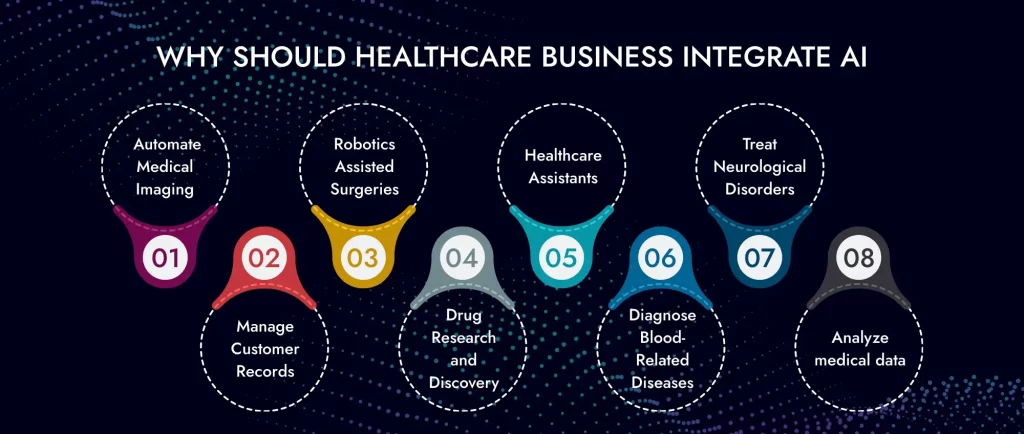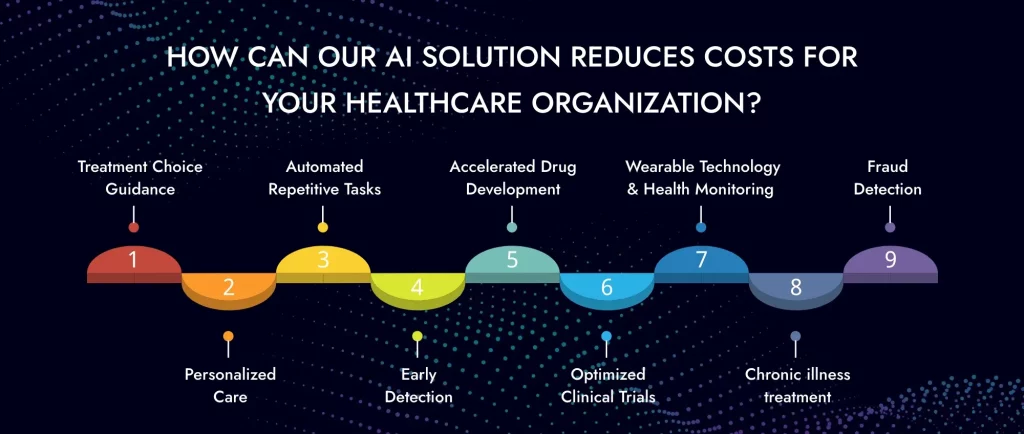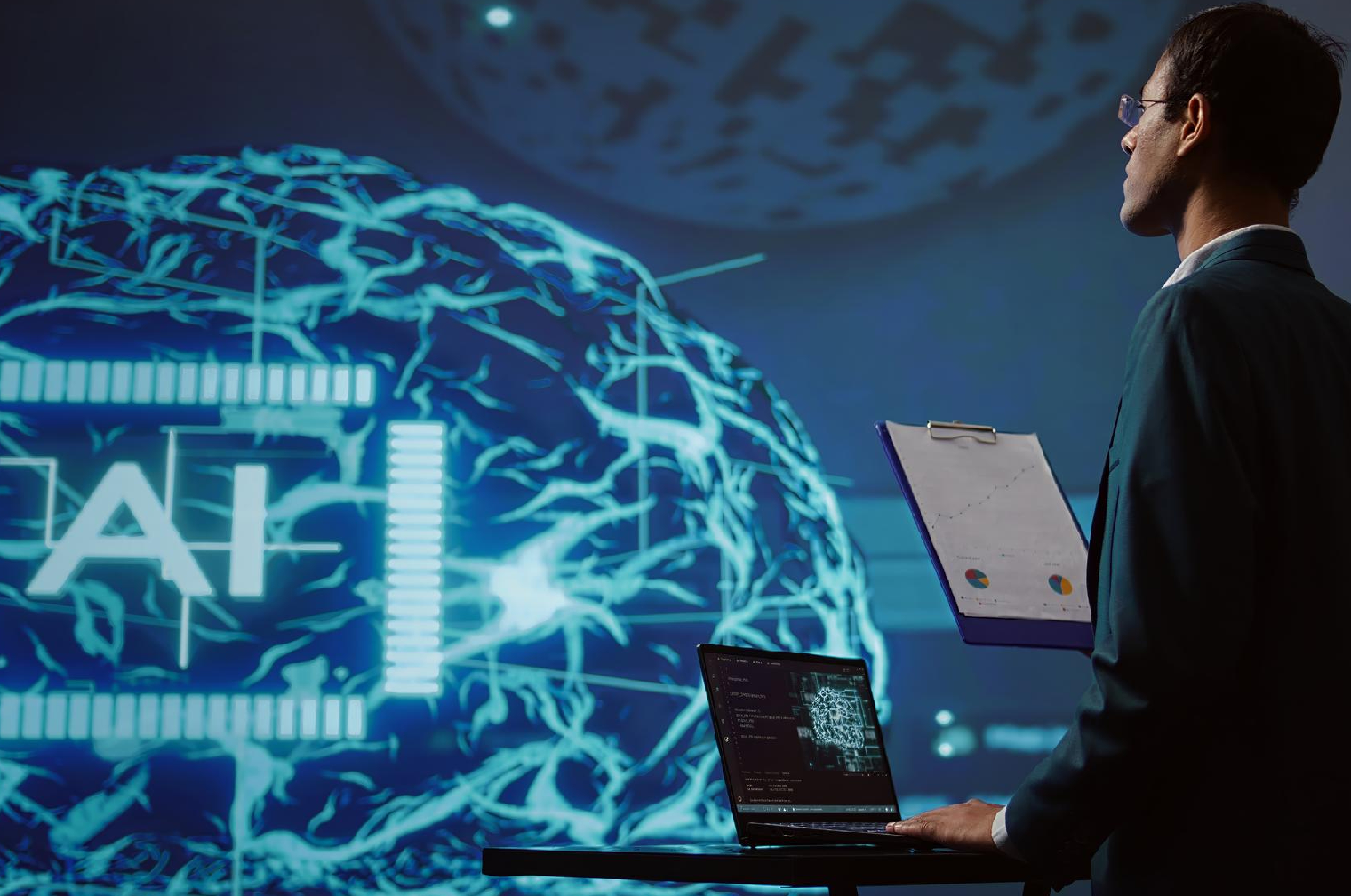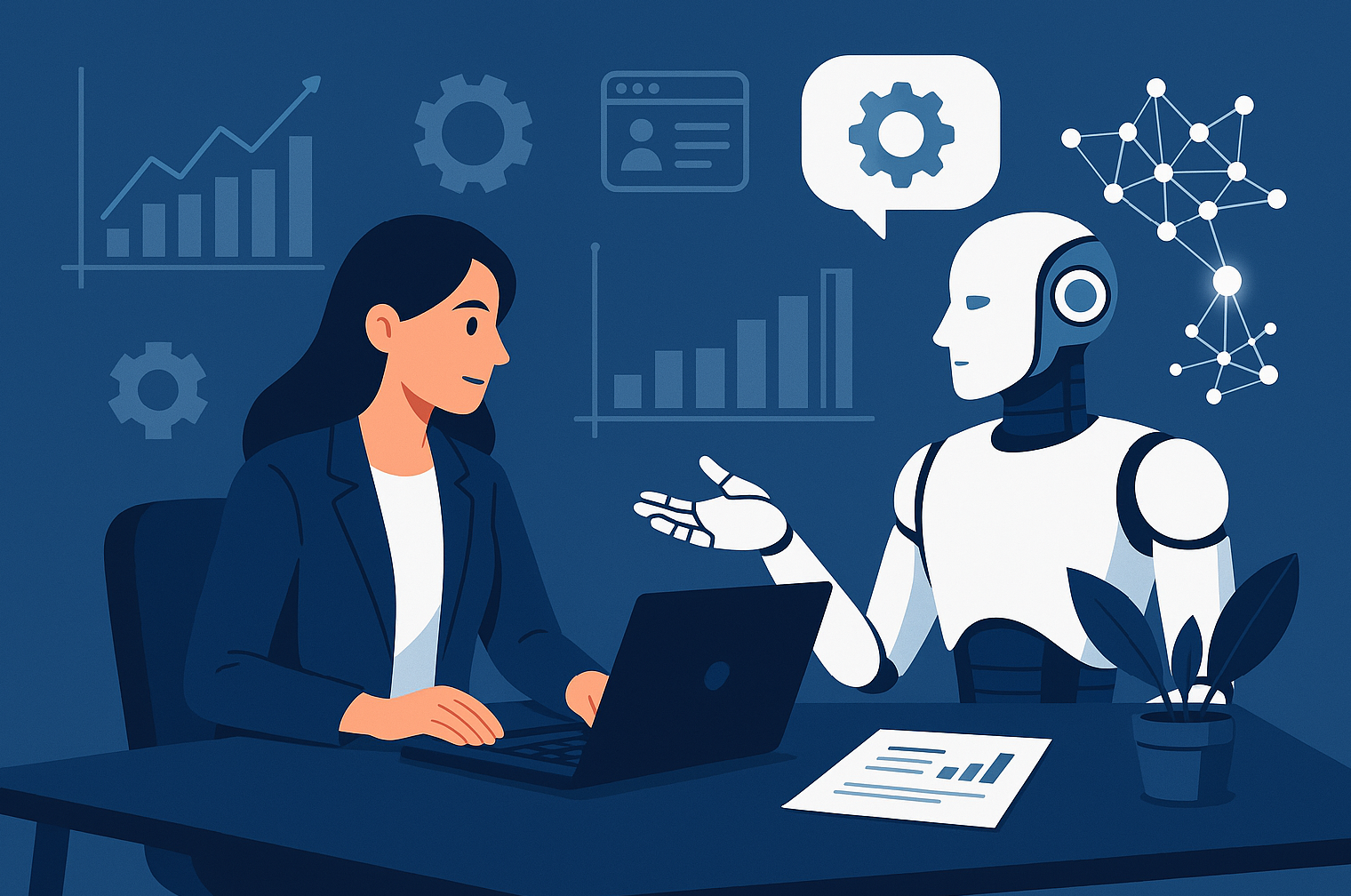Machine Learning and AI for revolution of Tech Companies are changing and streamlining businesses.
The healthcare sector is facing data overload, rendering traditional software systems incapable of effectively handling, evaluating & extracting meaningful information.
Artificial Intelligence development and integration could significantly reduce inefficiencies, enabling a more efficient and cost-effective healthcare ecosystem. The Internet of Medical Things (IoMT), Machine Learning (ML), and Deep Learning (DL) AI-driven technologies are transforming patient safety, hospital administration, drug development, and treatment decision-making, which then enhances healthcare delivery.
These innovations make operations run smoothly and enhance diagnosis and treatment accuracy, thus resulting in AI-driven cost reduction in healthcare and improving efficiency for better performance across the healthcare sector. How does healthcare cost optimization with ViitorCloud AI solution work?
Why Should Healthcare Businesses Integrate AI?
Artificial Intelligence transforms healthcare services by enhancing efficiency and lowering costs while improving patient care.
AI-powered solutions are changing everything from administrative tasks to clinical decisions within healthcare organizations. The discussion will explore what AI does in health care, highlighting various applications’ benefits and strategies for integration.

1. Automate Medical Imaging
AI-powered solutions in scanning and ultrasound technology are enhancing the accuracy of medical imaging.
AI can analyze and interpret complex imaging data using deep learning algorithms, providing more precise and reliable results. This reduces the likelihood of human error and ensures that critical conditions are detected early.
2. Manage Customer Records
Healthcare workers spend a lot of time on paperwork and administrative stuff. For example, Generative AI can support note-taking by clinicians at work, manage customer records or provide content summaries, ensuring every patient file is complete. It can also facilitate accurate coding through departments’ interconnectivity during billing cycles.
3. Robotics Assisted Surgeries
With AI-driven robots operating machinery in surgeries, navigating through otherwise delicate body organs and tissues is now possible. This process helps minimize blood loss during surgeries, prevents infections, and reduces pain post-surgery.
AI ensures surgical equipment reaches hospitals on time, making this operation more efficient even during emergencies.
4. Drug Research and Discovery
AI is transforming drug research and discovery by significantly speeding up development. Machine learning algorithms can analyze vast datasets to identify potential drug candidates, predict their efficacy, and optimize chemical structures. This reduces the time and AI-driven cost reduction in healthcare associated with traditional drug discovery methods.
AI can predict how new drugs interact with biological systems, allowing researchers to anticipate potential side effects and efficacy issues before clinical trials. By leveraging AI, pharmaceutical companies can make more informed decisions about which drug candidates to pursue, increasing the likelihood of successful outcomes.
5. Healthcare Assistants
These systems help to manage patient records, schedule appointments, and process insurance claims faster. Automation saves time through these data management activities, hence minimizing errors within hospitals, which generally leads to increased productivity among staff.
6. Diagnose Blood-Related Diseases
AI can help in creating personalized treatment plans for patients with blood-related diseases.
By analyzing individual patient data, including genetic information and treatment responses, AI systems can recommend tailored therapies that are most likely effective for each patient. This personalized approach improves treatment outcomes and reduces healthcare cost optimization with AI.
7. Treat Neurological Disorders
AI is also contributing to the development of innovative therapies for neurological disorders.
For example, AI-driven brain-computer interfaces are being developed to help patients with paralysis regain movement. These interfaces use machine learning to interpret and translate brain signals into actions, offering new hope for patients with severe neurological impairments.
8. Analyze medical data
There is a substantial proportion of errors in how people take medicine among outpatients. For instance, up to 70% of patients fail to adhere to prescribed insulin, as Nature Medicine Journal shows.
Stress can be monitored by using this tool to monitor patients who misuse their insulin pens or inhalers. A recent survey showed that 64% of patients would be comfortable with AI providing around-the-clock support, so clinical staff should focus on human-based care.
READ: Artificial Intelligence in Healthcare: How AI is Utilized in the Healthcare Industry
Transform your Healthcare Operations with AI. Use AI to reduce costs and improve efficiency. Partner with ViitorCloud for tailor-made AI solutions.
How Can Our AI Solution Reduce Costs for Your Healthcare Organization?
Significant financial constraints in the global healthcare industry result in between 20% and 30% of healthcare spending being wasted on inefficiencies. This amounts to an annual wastage of around $1,100 to $1,700 per person in the top 15 countries, with the least spent on healthcare at $120 per person for the last 50 countries.
It is crucial to address these inefficiencies as they potentially impact patients’ lives, and AI-powered solutions offer several opportunities to reduce outlays and improve the quality of care. In this article, we shall examine various ways AI can save healthcare costs.

1. Treatment Choice Guidance
AI can revolutionize clinical decision-making by drawing upon large patient outcomes datasets. Health providers are adopting standardization approaches for recording patient outcome data, which AI systems could analyze to identify trends and recommend best-suited treatments based on individual profiles of patients.
Such a personalized approach would help improve treatment effectiveness and minimize complications, which were discussed earlier, that are major cost drivers within different health systems.
2. Personalized Care
By solving an individual’s medical issues through personal patient data, AI ensures that effective and efficient treatments are applied, reducing cases of ineffective treatments and associated post-treatment complications.
Through optimizing treatment choices, better patient outcomes can be achieved at reduced costs due to artificial intelligence.
3. Automated Repetitive Tasks
For example, CT scans and other diagnostic tests are performed repetitively, and AI performs better than humans because it performs high-volume tasks well. The repetitive nature of such tasks often makes them prone to errors; hence, their accuracy and speed are improved if done using AI systems instead.
For instance, coronary aneurysms, brain bleeds, and malignant tissues within mammograms are certain conditions detected more accurately than human radiologists by some algorithms created by artificial intelligence.
4. Early Detection
To ensure effective treatment and cost savings, early diagnosis is essential. AI can process and analyze vast amounts of data quickly, enabling earlier detection of diseases. For example, AI has proven to be 99 percent accurate in reviewing mammograms thereby allowing for much earlier detection of breast cancer.
In osteoporosis, AI might identify early indicators, such as vertebral fractures, often missed by human diagnosis thus reducing long-term costs associated with managing the late stages of the disease.
5. Accelerated Drug Development
The period taken and the cost incurred during drug development can be significantly reduced by AI. By simulating millions of possible drug combinations and analyzing them using artificial intelligence algorithms that predict their efficacy against different diseases AI eliminates the need for expensive physical tests.
For instance, existing drugs have been repurposed to fight Ebola through artificial intelligence; this accelerated the development process, saving lives and other resources.
6. Optimized Clinical Trials
AI for cost-effective healthcare enhances clinical trial efficiency through biomarker monitoring platforms and the analysis of large patient datasets.
Therefore, gene-level identification of diseases and more precise selection of patients for trials can be done through artificial intelligence. Additionally, it lowers overall costs since data from at-home devices becomes available, resulting in fewer clinic visits.
7. Wearable Technology and Health Monitoring
Wearable technology provides real-time information on health parameters like heart rate or sleep patterns. People can get a health status report plus potential risks based on such details if AI analyzes them.
8. Chronic illness treatment
Mobile applications that are AI-supported can give tailored health advice and suggestions to those who have constant illnesses. Wearing these applications is a great step forward in reducing the number of hospital visits, thereby decreasing healthcare costs.
Patients with well-detailed health information are empowered to make choices, resulting in healthy lifestyles and reduced healthcare costs.
9. Fraud Detection
The healthcare industry loses about $380 billion annually to fraud, Medicare, and Medicaid abuse. AI healthcare cost optimization examines various health insurance trends that alert medical professionals to suspicious activities such as fraudulent claims for services not provided, unbundling procedures, and unnecessary tests.
ALSO READ: How AI Is Transforming Healthcare Startups: Key Benefits and Insights
Improve healthcare with AI innovation. Empower your healthcare business with AI. Collaborate with ViitorCloud to drive efficiency.
Successful healthcare startups who use AI in their Business
This is a revolution in the healthcare sector spurred by the integration of artificial intelligence (AI) and advanced technologies. Here, we focus on 3 emerging companies: Neko Health, Insitro, and LifeLensHealth which have made huge contributions to this field.
1. Neko Health
With its sophisticated AI technology and cutting-edge sensor technology, Neko Health is changing how people think about prevention. Neko Health also conducts non-intrusive whole-body scans collecting extensive medical data to help you get a complete picture of your health.
Neko Health’s Body Scan service uses more than 70 sensors to analyze over 50 million data points per person. Artificial Intelligence eliminates laborious manual regulatory compliance reporting through automation allowing this company to be per complex laws guiding health systems moderation expenses.
2. Insitro
Insitro has employed machine learning to innovate drug discovery and development processes. Using genetic clinical phenotypic data fusion enables Insitro to make highly predictable models.
They create in vitro disease models that mimic human clinical results using patient-derived stem cells, genome editing, and machine learning algorithms. This has enabled the identification of previously unknown sub-categories of diseases and interventions that promote health, hence a large stride towards personalized medicine and focused treatments.
3. LifeLens
Due to enhanced AI diagnostic accuracy and cost efficiency, LifeLens is gaining attention in the diagnostics sector. The initial test costs have decreased by almost 30% thanks to optimizing the diagnosis process within it.
Such an increase would result in yearly savings worth over $5 million. Faster and better quality diagnoses help medical professionals and ensure prompt detection and prevention for patients, thus contributing to better health conditions and lesser expenses on long-term treatment.
ALSO SEE: How AI Is Redefining Healthcare: 11 Transformative Applications
Implement AI to optimize healthcare costs. AI is key to the improvement of healthcare. Let ViitorCloud assist you in the seamless implementation of the most appropriate solutions.
How can ViitorCloud help Healthcare with AI Solutions?
In today’s fast-changing world artificial intelligence is important for the success of businesses. Via collaboration with ViitorCloud, a leading AI development company, firms within the healthcare sector can leverage this revolutionary technology and reduce AI healthcare cost optimization.
Using advanced AI development services that ViitorCloud offers to healthcare companies, they can create tailor-made tools based on artificial intelligence to improve their operational efficiency and streamline their supply chain management. Such things include predictive analysis, real-time tracking, and automated route planning among others such as intelligent inventory management that can be transformed using AI integration strategy in healthcare processes.
Ensuring sustainable growth, increased accuracy, and better service delivery through using AI in healthcare with ViitorCloud. Why wait? Partner with ViitorCloud today and move on a journey to transform your healthcare business with cutting-edge AI solutions.
Frequently Asked Questions
AI reduces healthcare costs by improving diagnosis accuracy, optimizing treatment plans, and automating administrative tasks, thus minimizing unnecessary treatments, hospital stays, and operational inefficiencies.
AI optimizes healthcare industries by enhancing data analysis, streamlining workflows, personalizing patient care, and improving decision-making through predictive analytics, leading to better outcomes and resource utilization.
AI improves efficiency in healthcare by automating routine tasks, assisting in early diagnosis, reducing human error, and providing real-time patient data, allowing healthcare professionals to focus more on direct patient care.









